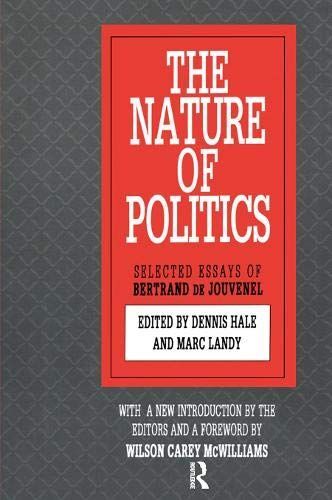
The Nature of Politics
Bertrand de Jouvenel (1903-1987) was one of the great political thinkers of the twentieth century, but he left few disciples. The essays contained in this volume have been selected because they serve to clarify, elaborate, and expand upon the themes of his three masterworks: On Power, Sovereignty, and The Pure Theory of Politics. De Jouvenel's thought stands apart from the main branches of twentieth-century political philosophy and is largely independent of schools and ideologies. By drawing on an older, more persuasive philosophical tradition stretching from Plato to Rousseau, de Jouvenel sought to restore political science to its ancient function: the explanation of political things. With directness and originality, his work addresses questions that go to the heart of the political science enterprise, exploring its nature, its mission, and its attitude to theory, facts, and values. In the realm of political practice, de Jouvenel shares common ground with his contemporaries while remaining essentially independent. He shares with the left a deep concern for reducing human misery and ecological depredation and a belief in the need for government-directed economic planning. On the other hand, he shares the right's abiding suspicion of state power and its belief in the superiority of the market as the presumptive method for economic decision making. De Jouvenel's refreshing freedom from ideological blinders makes him worthy of comparison to Orwell, but his ambition stretches beyond the novelistic in that he attempts to develop a theory of the good state resting upon a clear-sighted understanding of the true nature of political behavior. Graced with a brilliant introduction by Dennis Hale and Marc Landy, this volume serves as an ideal introduction to de Jouvenel's thought. It will be of interest to political scientists, historians, and sociologists. ealm of political practice, de Jouvenel shares common ground with his contemporaries while remaining essentially independent. He shares with the left a deep concern for reducing human misery and ecological depredation and a belief in the need for government-directed economic planning. On the other hand, he shares the right's abiding suspicion of state power and its belief in the superiority of the market as the presumptive method for economic decision making. De Jouvenel's refreshing freedom from ideological blinders makes him worthy of comparison to Orwell, but his ambition stretches beyond the novelistic in that he attempts to develop a theory of the good state resting upon a clear-sighted understanding of the true nature of political behavior. Graced with a brilliant introduction by Dennis Hale and Marc Landy, this volume serves as an ideal introduction to de Jouvenel's thought. It will be of interest to political scientists, historians, and sociologists.